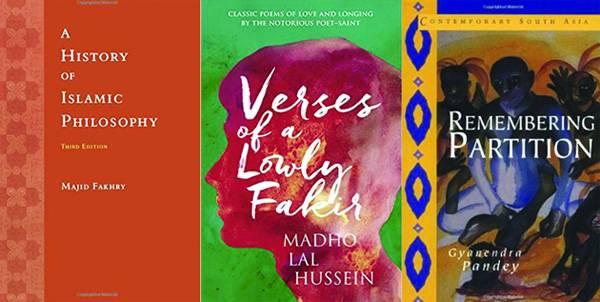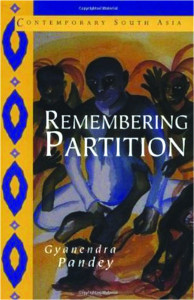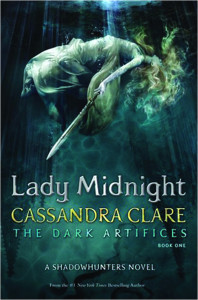

A History of Islamic Philosophy
Majid Fakhry
Columbia (paperback), 2004
PRs 1995
The first comprehensive survey of Islamic philosophy from the seventh century to the present, this classic discusses Islamic thought and its effect on the cultural aspects of Muslim life. Fakhry shows how Islamic philosophy has followed from the earliest times a distinctive line of development, which gives it the unity and continuity that are the marks of the great intellectual movements of history.
ABOUT THE AUTHOR
Majid Fakhry is professor emeritus of philosophy at the American University of Beirut and adjunct professor at Georgetown University. He is the author of several books, including Averroes: His Life, Works, and Influence; Islamic Philosophy, Theology, and Mysticism; Ethical Theories in Islam; Al-Farabi, Founder of Islamic Neoplatonism; and Philosophy, Dogma, and the Impact of Greek Thought on Islam, in addition to fifteen titles in Arabic. He has recently published a translation of the Qur’an entitled An Interpretation of the Qur’an: A Bilingual Edition.

Kinship, Honour and Money in Rural Pakistan
Alain Lefebvre
Curzon (hardcover), 1999
PRs 1995
International migration is favoured by the governments of many poorer countries despite often well-publicized abuses affecting individual migrant workers. Not only is local unemployment reduced but also it is expected that the migrants will learn new skills, with many even becoming entrepreneurs on their return home. Meantime they are seen as a source of foreign remittances, providing needed capital for economic development. Such is the attitude in Pakistan from where thousands of migrant workers leave every year for the Gulf states especially.
An anthropological study approaching this issue from a local (village) level, this book focuses on two areas of the Punjab. Describing the historical passage of rural life from pre-colonial times to the present, it shows how the rural economy of the Punjab was not transformed by the green revolution - on the contrary, it is still a subsistence economy. The resulting poverty combined with Pakistan’s labour-market policies forces many Punjabi men to seek work abroad, in turn bringing changes to the economic role of the women left behind. Remittances from abroad have brought further changes on the economic and social life of the villages but not, as expected, to bring economic development let alone capital or entrepreneurialism to the area.

Verses of a Lowly Fakir
Madho Lal Hussain – Translated by Naveed Alam
Penguin Classics (hardcover), 2016
PRs 800
Poet, weaver, mystic, saint, Shah Hussein created a stir in sixteenth-century Punjab through his unconventional lifestyle and the subversive power of his poetry. Popularly known as Madho Lal Hussein, after he adopted the name of his young lover and disciple, he remains a beguiling, enigmatic figure: a firebrand whose growing fame was a cause of anxiety for the political elite, a Muslim who fell in love with a Hindu boy and won his heart and devotion, a rebel philosopher who found solace in ignominy.
Deceptively simple and astonishingly relevant, the poems in this magnificent collection are charged with longing, and offer insight into the true nature of love and death, desire and sublimation. Naveed Alam’s lilting translation brings out the verve and allure of Hussein’s verses, which continue to be sung and recited over 400 years after his death.

Remembering Partition
Gyanendra Pandey
Cambridge (paperback), 2001
PRs 495
Through an investigation of the violence that marked the partition of British India in 1947, this book analyses questions of history and memory, the nationalisation of populations and their pasts, and the ways in which violent events are remembered (or forgotten) in order to ensure the unity of the collective subject - community or nation. Stressing the continuous entanglement of ‘event’ and ‘interpretation’, the author emphasises both the enormity of the violence of 1947 and its shifting meanings and contours. The book provides a sustained critique of the procedures of history-writing and nationalist myth-making on the question of violence, and examines how local forms of sociality are constituted and reconstituted, by the experience and representation of violent events. It concludes with a comment on the different kinds of political community that may still be imagined even in the wake of Partition and events like it.

Lady Midnight: The Dark Artifices
Cassandra Clare
Simon & Schuster (paperback), 2016
PRs 995
The Shadowhunters of Los Angeles star in the first novel in Cassandra Clare’s newest series, The Dark Artifices, a sequel to the internationally bestselling Mortal Instruments series. Lady Midnight is a Shadowhunters novel.
It’s been five years since the events of City of Heavenly Fire that brought the Shadowhunters to the brink of oblivion. Emma Carstairs is no longer a child in mourning, but a young woman bent on discovering what killed her parents and avenging her losses.
Together with her parabatai Julian Blackthorn, Emma must learn to trust her head and her heart as she investigates a demonic plot that stretches across Los Angeles, from the Sunset Strip to the enchanted sea that pounds the beaches of Santa Monica. If only her heart didn’t lead her in treacherous directions…
Making things even more complicated, Julian’s brother Mark—who was captured by the faeries five years ago—has been returned as a bargaining chip. The faeries are desperate to find out who is murdering their kind—and they need the Shadowhunters’ help to do it. But time works differently in faerie, so Mark has barely aged and doesn’t recognize his family. Can he ever truly return to them? Will the faeries really allow it?
Glitz, glamours, and Shadowhunters abound in this heartrending opening to Cassandra Clare’s Dark Artifices series.

